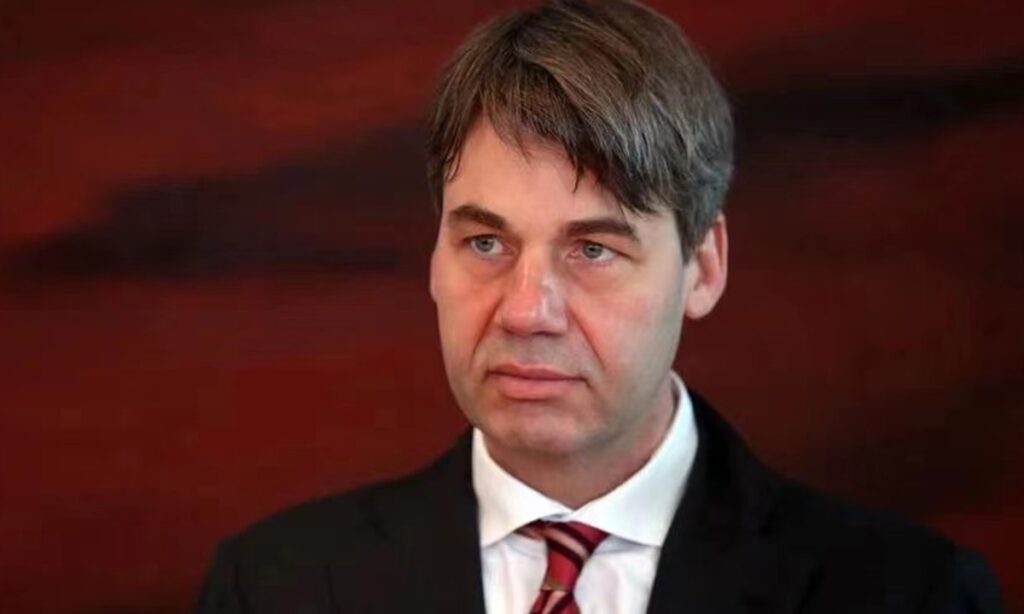Chinese Foreign Ministry expressed deep condolences to the sudden death of the German Ambassador to China Jan Hecker, who has passed away after only two weeks in the role after being appointed in August.
“We are shocked to learn of the sudden death of Ambassador Jan Hecker, who had been working actively to promote China-Germany relations since assuming his post. We mourn and regret his passing and extend sincere condolences to his loved ones,” Chinese Foreign Ministry spokesperson Wang Wenbin said on Monday at the regular press conference.
China would like to provide as much convenience as possible for Hecker’s family and the German Embassy in China to deal with the follow-up matters, Wang said.
Hecker’s death was confirmed by the German Embassy on Monday, with a website statement saying “It is with deep sadness and consternation that we heard the sudden death of the German ambassador to China, Prof. Dr. Jan Hecker. At this moment, our thoughts are with his family, relatives, friends and colleagues.”
Without revealing details of Hecker’s death, the embassy lowered German national flag and EU flag in front of the embassy’s building in Beijing, at half-mast, Global Times found.
On September 3, the last working day before Hecker’s death, the ambassador presided over the opening ceremony of a cultural event that marks the birth centennial of Joseph Beuys, a revolutionary German curator, at the residence of the German Embassy in China.
A group of teachers and students from the Central Academy of Fine Arts also attended the event, some described the ambassador as “easy-going,” media reported.
Before taking up the post, Hecker, 54, was a foreign policy advisor to German long-serving Chancellor Angela Merkel who will leave office after the upcoming election.
Hecker took the office on August 24. In a statement posted in August by the German embassy on his new role, Hecker said he hoped to contribute to the long-term and stable development of Germany-China relations, which is in the interest of both peoples, and China and Germany should enhance dialogue and cooperation.
Some analysts said that Hecker’s appointment in August showed Merkel’s intention of continuing her route and principle on relations with China, even after her retirement in September.
“I mourn the loss of a highly esteemed adviser of many years, with deep humanity and outstanding expertise. I think of our cooperation with gratitude and am glad to have been so closely associated with him over the years,” said Merkel in a written statement Monday, CNN reported.
The ambassador Hecker was a practical and realistic man of action, Zhang Bei, assistant research fellow at the Department for European Studies of Beijing-based China Institute of International Studies, told the Global Times on Monday.
The ambassador carried the expectation of continuing the cooperation of the Merkel era … All those who look forward to China-Germany friendship do not want to accept Hecker’s passing, Zhang said.
Zhang further explained that although an ambassador’s ability and charm are conducive to promoting bilateral cooperation, in general, it still depends on the new German government and the European policy toward China.
The German election is a tight race, and the circumstances of forming a new cabinet government are uncertain.
China expects Germany, as a major country in Europe, to demonstrate strategic autonomy and continue its mutually beneficial cooperation with China, Zhang said.
Frank Rückert, Hecker’s deputy, will take over his duties for the time being, Deutsche Welle reported.
Experts said the ambassador’s vacancy will have limited impact on the overall operation of the German embassy, but it is unclear whether Germany will be in a hurry to appoint a new ambassador. And the next ambassador is likely to be appointed by the new government.
German Ambassador to China Jan Hecker.




